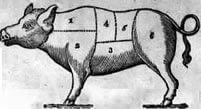Shutting down all coal overnight is obviously not realistic soon. But the challenge presented by climate change requires both leaps of imagination and hard thinking about the efficiency of solutions https://econ.st/4i7fQVF
ventriloquism (ven-TRIL-uh-kwiz-uhm)
noun:
1. The art or practice of speaking without moving lips so that the voice seems to be coming from somewhere else.
2. The expression of one's views through another person, used as a literary technique.
Etymology
Literally speaking, ventriloquism is speaking from the stomach, from the former belief that the voice was produced from the ventriloquist's belly. The word is derived from Latin ventriloquus (ventriloquist), from ventr- (belly) + loqui (to speak). Earliest recorded use: 1797.
Usage
"'In recreating his mother as a resourceful and often hilarious character Walters's sustained act of literary ventriloquism captures the ingenuity and passion of the diasporic narrative in Canadian cultural history,' the jurors said in a statement." — Immigrant Tale Wins $10K Creative Non-Fiction Prize; CBC News (Toronto, Canada); Oct 13, 2010.
paunchy
adj., -i·er, -i·est.
Having a potbelly.
paunchiness paunch'i·ness n.
| paunchy | (adjective) Having a large belly. | |||
| Synonyms: | abdominous, potbellied | |||
| Usage: | He was … a plump, paunchy, sturdy-looking fellow. |
High on the hog
MeaningAffluent and luxurious.
Origin
 The source of this phrase is often said to be the fact that the best cuts of meat on a pig come from the back and upper leg and that the wealthy ate cuts from 'high on the hog', while the paupers ate belly pork and trotters. The imagery of lords and ladies feasting on fine meats, done to a turn, at Olde Englyshe banquets is easy to bring to mind and this seems to be the right context for the phrase to have been coined in. However, as far as the source of this expression goes, our imagination needs to leap forward a few centuries.
The source of this phrase is often said to be the fact that the best cuts of meat on a pig come from the back and upper leg and that the wealthy ate cuts from 'high on the hog', while the paupers ate belly pork and trotters. The imagery of lords and ladies feasting on fine meats, done to a turn, at Olde Englyshe banquets is easy to bring to mind and this seems to be the right context for the phrase to have been coined in. However, as far as the source of this expression goes, our imagination needs to leap forward a few centuries. None of the variants of the phrase 'living (or eating) high on (or off) the hog' is to be found in any of the works of Chaucer, Shakespeare or the like. In fact, they aren't found in print in any form until the 20th century, and then in the USA rather than England.
'High' has been in used in the UK with the meaning 'impressive; superlative; exalted' since the 17th century and in the USA since the early 19th century. For example, this from Samuel Pepys Diary or, as he liked to call it, Samuel Pepys' Memoirs - Comprising his Diary, in the entry for 29th July 1667:
"Where it seems people do drink high."The word alluded to people's status and is the source of the terms 'high-life' (18th century), 'high-table' (15th century) and even 'high-heaven' (9th century).
The idea that 'living high on the hog' initially meant 'living the high life' and eating pork, rather than literally 'eating meat from high on the pig', seems plausible but is dealt a blow by the following citation. This is the earliest printed form of the phrase that I have come across - from the New York Times, March 1920:
Southern laborers who are "eating too high up on the hog" (pork chops and ham) and American housewives who "eat too far back on the beef" (porterhouse and round steak) are to blame for the continued high cost of living, the American Institute of Meat Packers announced today.'High off the hog' has a similar pedigree, i.e. mid 20th century USA. For example, the San Francisco paper the Call-Bulletin, May 1946:
I have to do my shopping in the black market because we can't eat as high off the hog as Roosevelt and Ickes and Joe Davis and all those millionaire friends of the common man.Why, when people had eaten pork for millennia, did the phrase not originate before the 20th century, is a difficult question to answer. Nevertheless, 'high on the hog' appears to have been derived, in the USA, as a reference to the cuts of meat on pigs. The question of why the clunky idiom 'eating too far back on the beef' didn't quite catch on with the public is a little easier to resolve.
沒有留言:
張貼留言